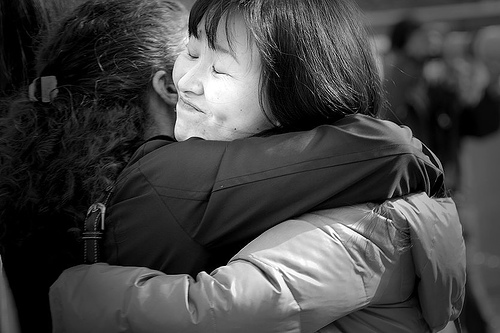I noticed them when they arrived.
The pleats of her skirt made a feminine flounce out of the stiff fabric. Her hair was perfectly coiffed. He wore slacks and a sports jacket, the unassuming tailored affair of the wealthy.
They were seated at our table. His smile spread warmly across his face, sparkling in his eyes as he firmly shook my hand in introduction. She was quiet, but she leaned towards me in friendly confidence as she spoke with her face close to mine of their recent travels in Europe.
She asked if I’d gotten to travel much. I told her of my year in Belize. Of my travels in China. Of our time in India. With this last mention, her eyes grew wide as she sat away from me in her chair, her chin tilted.
“So you’ve been to India,” she said. “What did you think?” She spoke with a hushed frenzy, as if about to hear a piece of juicy gossip.
I smiled as I remembered our brief trip. I told her of the precious friends we’d made, of the welcome we received. I told her of the delicious food, the beauty of the sea, the rich history. I told her of the incredible ministry and development work we observed, of the people who are tirelessly and creatively working to improve the lives of the children and the poor.
As I spoke, my mind walked through my memories, transporting me to the other side of the world. We were sitting around the table with our newly made friends. We passed around the bowls filled with the Indian dishes I had watched being made in their kitchen earlier in the day. I had tried to take notes enough to replicate it at home. So many good conversations around that table. So much laughter. My heart swelled with fondness, with a desire to return, with longing to be with those precious people again.
“We traveled there several years ago,” she said. “I desperately wanted to see the Taj Mahal. So, my sweet husband,” here she smiled across the table at him, “surprised me with a trip.”
I smiled, nodding. I love hearing about the adventures of others, particularly to places I’ve been, particularly to places I love.
“Well, I will never go back there,” she said, with breathy disgust.
This was not what I was expecting. I tried not to let the confusion show on my face. It was clear I wouldn’t have to ask for the details of their disastrous trip.
“One day, they were driving us around, and they took us through the poor part of the city. The way those people lived! I have never seen anything like it. So much poverty. The dirt. Those children…”
In my mind, I was on the back of a moped, clinging to the waist of the caseworker as we wound through the streets to the small slum where the transient construction workers were living with their families. The children would spread a tarp under the shadow of the rising concrete facade of an apartment complex and sit at our feet. They brought me their notebooks with deliberately traced letters. I pointed to the figure. “A,” they would say. Then the next. “B,” they would say. I could feel the curious eyes of their mothers as they peeked out from their doors at my back.
I was hearing the voice of the caseworker as we walked away—“I was once one of those children. But people came who cared about me, and they made sure I got an education. Now, I can do the same thing.” I thought of the money she was saving to care for her ailing father.
My attention returned to the woman beside me, now leaning in again as she spoke. “When you get to be my age, seeing things like that changes you.” She shuddered and shook her head—as if the mental image were on an etch-a-sketch and she could shake it away.



